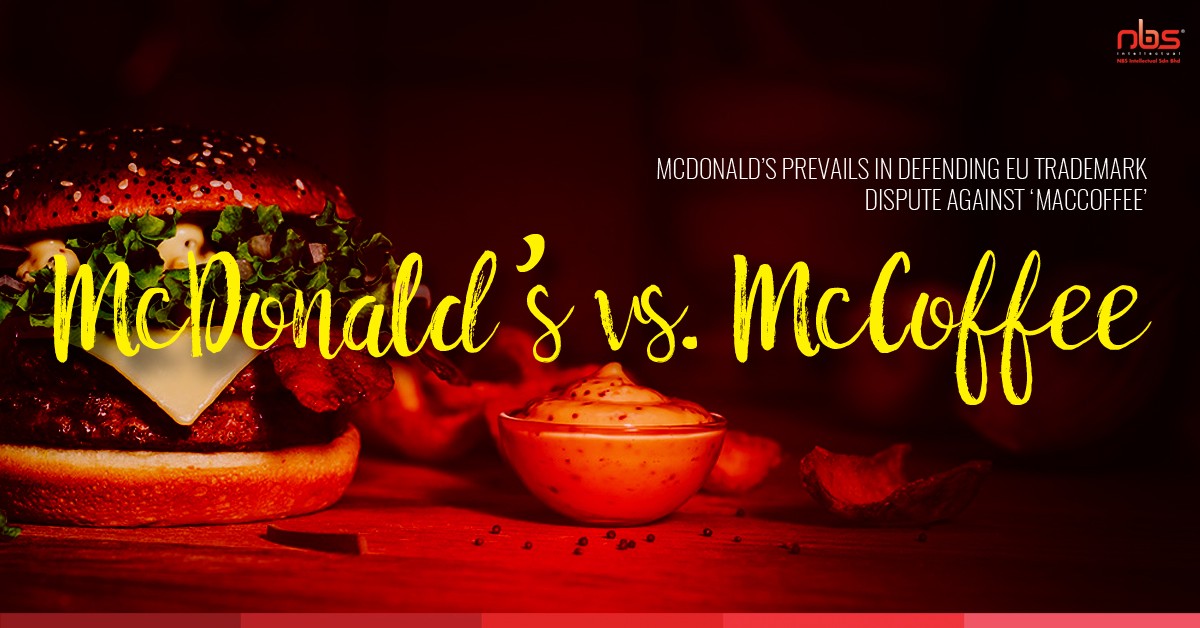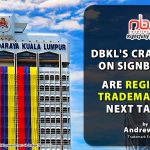MCDONALD’S PREVAILS IN DEFENDING EU TRADEMARK DISPUTE AGAINST ‘MACCOFFEE’
The dispute arises when Future Enterprises Pte Ltd, a company established in Singapore, filed an application for their trademark “MACCOFFEE” on 13th October 2008 in the European Union. It is a fact that prior to its application, McDonald’s International Property Co. Ltd owns several registered trademark bearing the word “Mc” or “MAC” in the EU as follows:
– European Union word mark “McDONALD’S”, lodged on 1 April 1996 and registered on 16 July 1999 under No 62 497, for the goods and services in classes 29, 30, 32 and 42;
– European Union word mark “McFISH”, lodged on 18 April 2006 and registered on 20 July 2007 under No 5 056 429, for the goods in classes 29 and 30;\
– European Union word mark “McTOAST”, lodged on 24 October 2005 and registered on 20 April 2007 under No 4 699 054, for the goods and services in classes 29, 30 and 43;
– European Union word mark “McMUFFIN”, lodged on 27 July 2005 and registered on 7 August 2006 under No 4 562 419, for the goods and services in classes 29, 30 and 43;
– European Union word mark “McRIB”, lodged on 19 November 1999 and registered on 11 June 2001 under No 1 391 663, for the goods in classes 29 and 30;
– European Union word mark “McFLURRY”, lodged on 30 June 1998 and registered on 8 September 1999 under No 864 694, for the goods in class 29;
– European Union word mark “CHICKEN McNUGGETS”, lodged on 1 April 1996 and registered on 4 August 1998 under No 16 196, for the goods in class 29;
– European Union word mark “McCHICKEN”, lodged on 1 April 1996 and registered on 2 February 1998 under No 16 188, for the goods in class 30;
– European Union word mark EGG “McMUFFIN”, lodged on 1 April 1996 and registered on 19 December 1997 under No 15 966, for the goods in class 30;
– European Union word mark “McFEAST”, lodged on 1 April 1996 and registered on 27 October 1999 under No 15 941, for the goods in class 30;
– European Union word mark “BIG MAC”, lodged on 1 April 1996 and registered on 22 December 1998 under No 62 638, for the goods and services in classes 29, 30 and 42;
– European Union word mark “PITAMAC”, lodged on 1 February 2005 and registered on 11 April 2006 under No 4 264 818, for the goods and services in classes 29, 30 and 42;
– the well-known German trademark McDonald’s, for the goods and services in classes 29, 30, 32 and 43.
Based on the ownership of the abovementioned trademarks, on 13th August 2010, McDonald’s brought an application for a declaration of invalidity of the “MACCOFFEE” mark, for all of the goods in respect of which “MACCOFFE” had been registered. Subsequently, the EU Registry’s Cancellation Division uphold McDonald’s plea in its application and declared that the “MACCOFFEE” to be invalid in its entirety. Consequently, Future Enterprise filed in an appeal against the Registry’s decision at the General Court of Strasbourg, Germany which was subsequently dismissed in July 2016 where the General Court uphold the Registry’s decision.
Rulings of the General Court
In summary, the Court ruled as follows:
1. The elements ‘mc’ and ‘mac’ in the marks at issue are associated, by the relevant public, with the same idea, namely the prefix of a Gaelic surname and the word “Coffee” can be easily understood due to its descriptive English meaning. Association between the elements “mc” and “mac” with such a descriptive word is not unusual;
2. The goods represented by “MCCOFFEE” can be easily found within McDonald’s fast food chain;
3. The marks in question are conceptually similar to a certain extent; and
4. The overall similarity existing between the marks at issue, which is sufficient for the relevant public to establish a link between them, even if it does not confuse them (despite differing in terms of visual)…
Based on the above findings, it was sufficiently established that the use without due cause of the “MACCOFFEE” mark took unfair advantage of the repute of the McDonald’s trade mark. It indeed felt it was highly likely that “MACCOFFEE” mark rode on the coat-tails of the McDONALD’S trade mark, in order to benefit from its power of attraction, its reputation and its prestige, and exploited, without paying any financial compensation, the marketing effort made by the intervener in order to create and maintain the image of the McDONALD’S trade mark. Since none of the complaints raised by the Future Enterprise have been upheld, the appeal was dismissed in its entirety.
Having regard the above ruling by the General Court, Future Enterprise is still entitle for one final appeal to the European Court of Justice where its decision shall be final. Whether or not Future Enterprise will proceed with said appeal is a different story.
Moral of the story that can be extracted from the case above is that even though two marks may have been differ visually, but surrounding circumstances as laid down by the court above also play a major role in determining whether the later mark is in fact infringing or passing off an earlier mark. The best solution to avoid the above dilemma is to come up with a unique branding of your own without having reference to any other big brands to avoid speculations on the so call free ride on other’s reputation. MACCOFFEE here clearly fits the bill as it can easily be associated by the public to McDonald’s due to the prefix “MAC”. The word “COFFEE” here plays a really minor role due to its descriptive meaning.
If you need to know more about the trademark registration process or questions,
Please Contact Us: 03-58914846
Or Email Us: [email protected]
Website: www.nbs.com.my
©ANTHONY THAY OF NBS INTELLECTUAL SDN. BHD.
ALL RIGHTS RESERVED







Comments are closed.